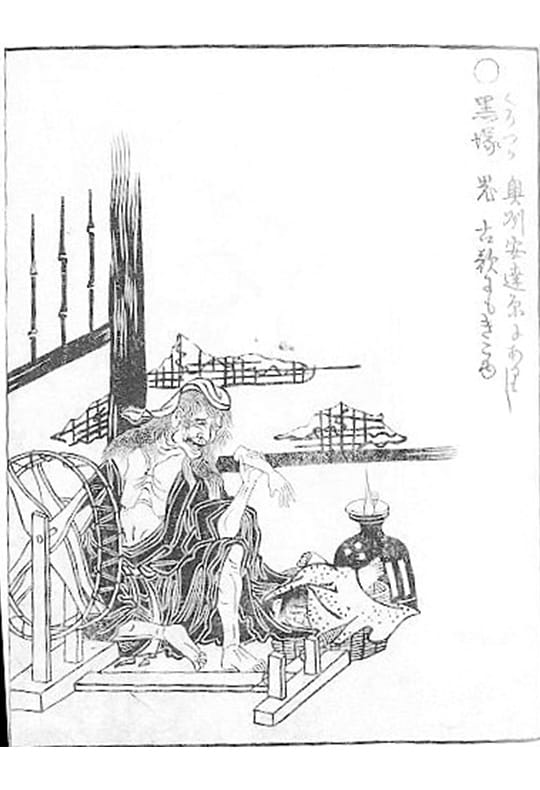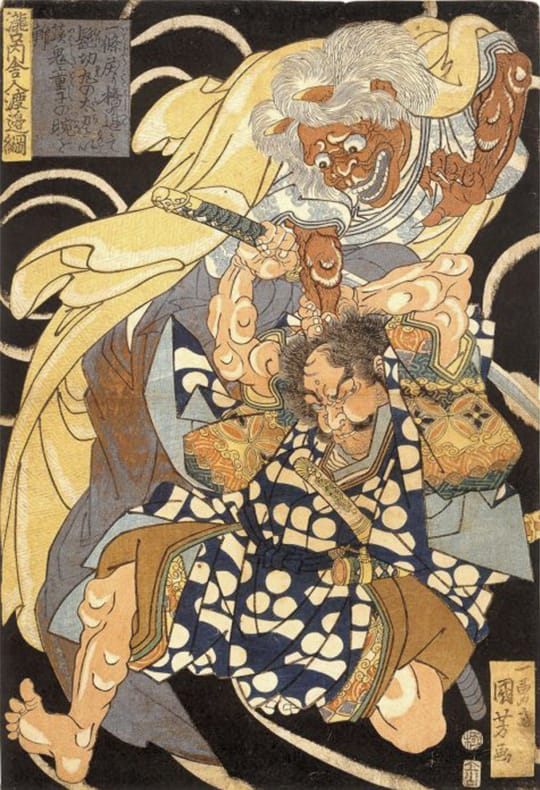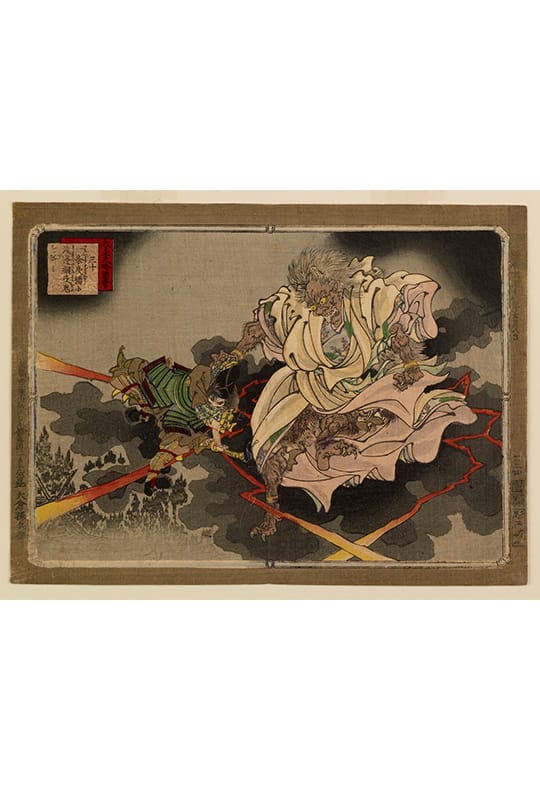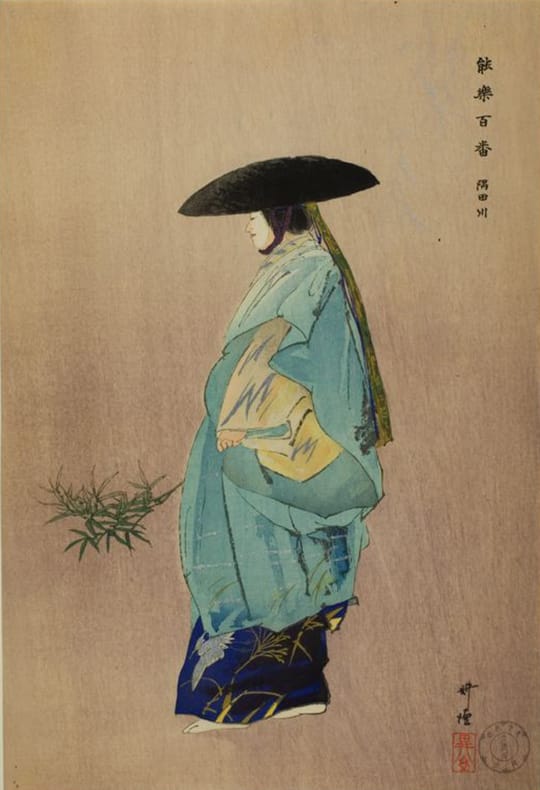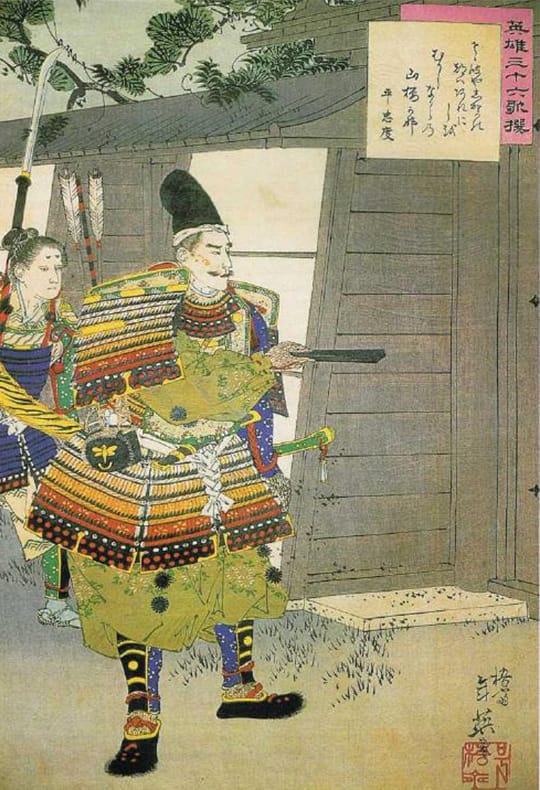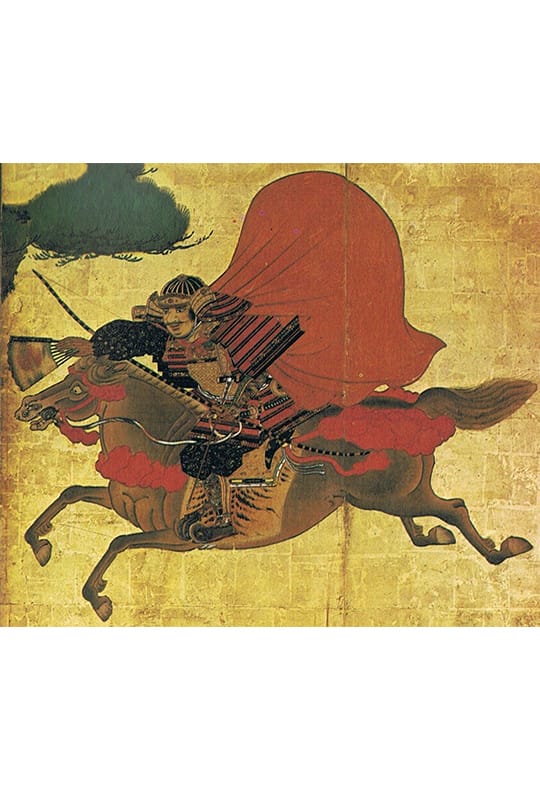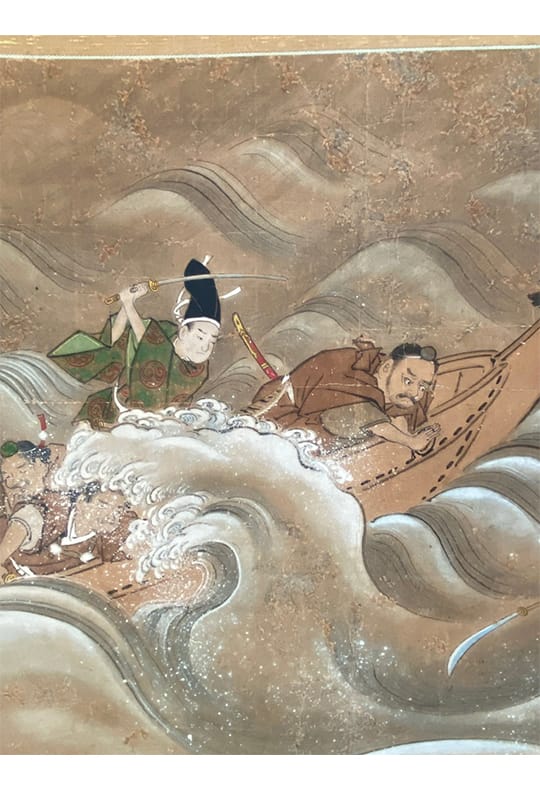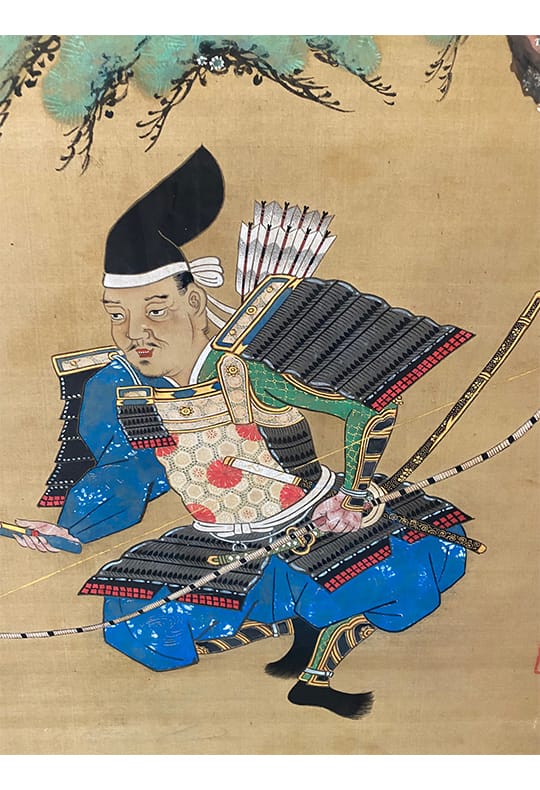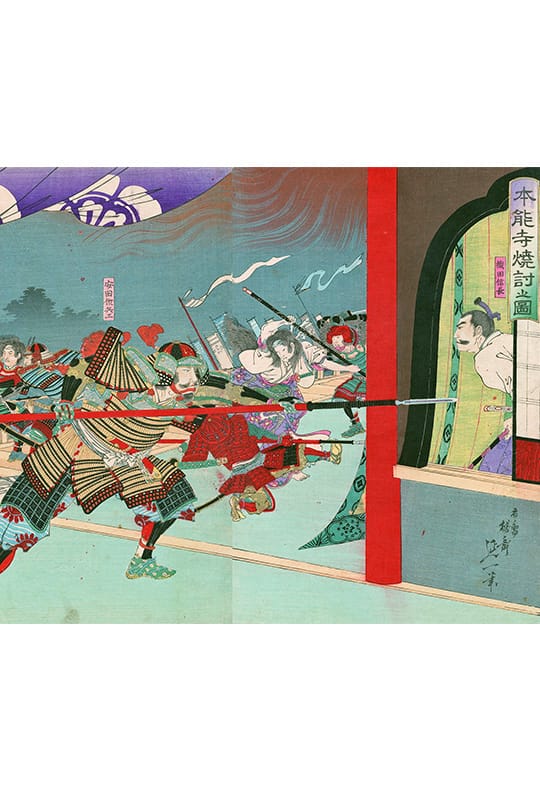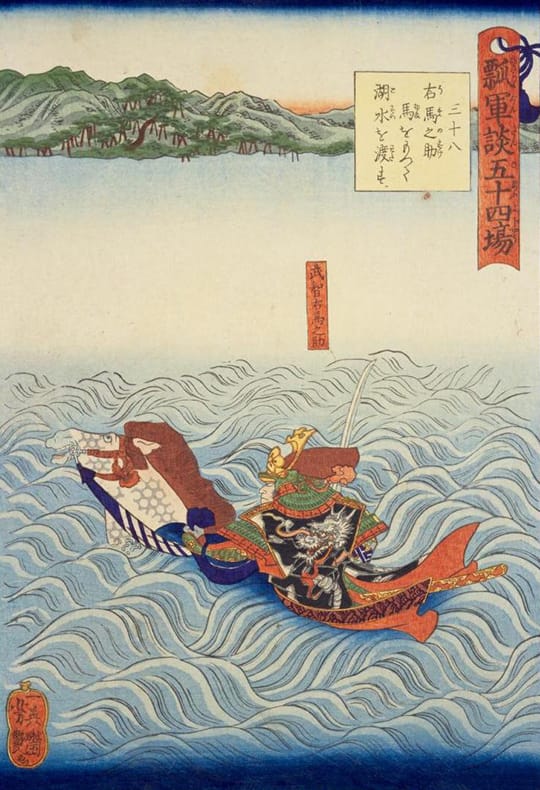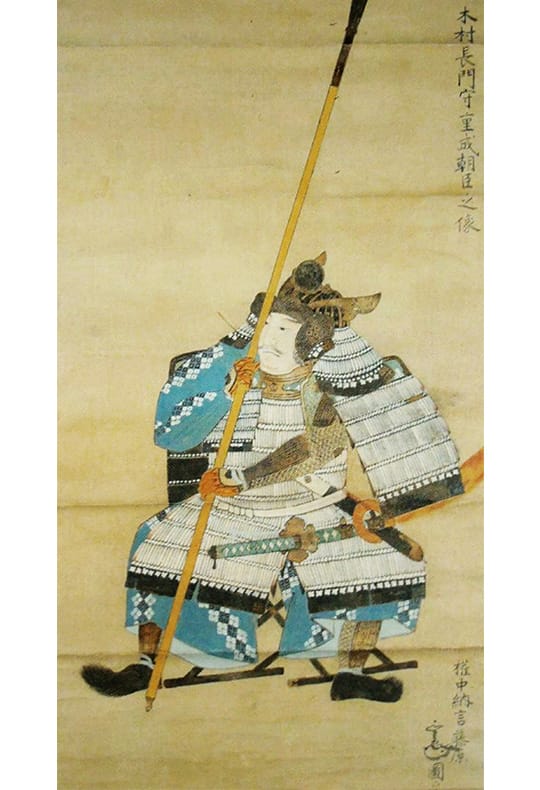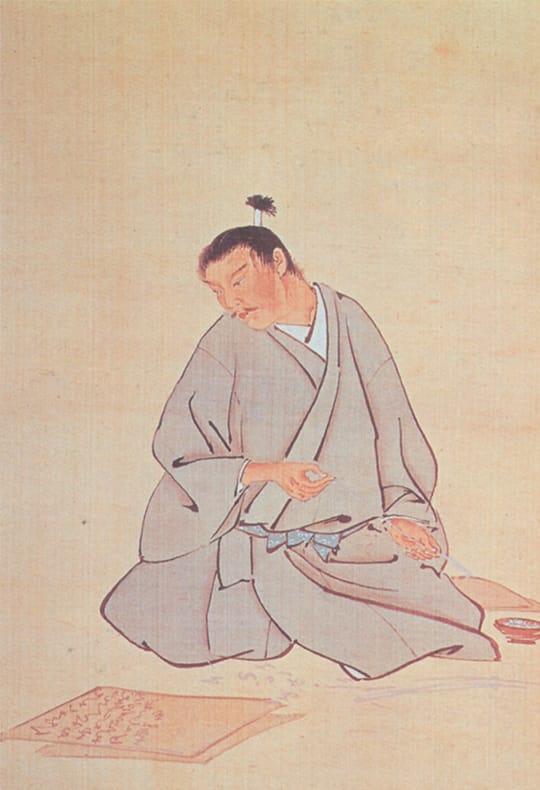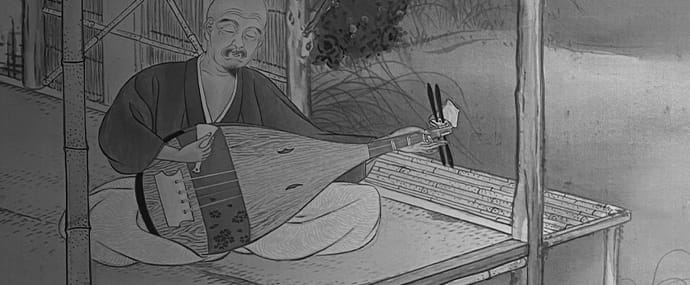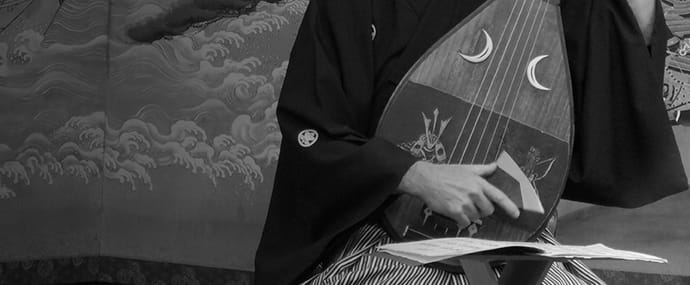Kyoto-search

tsuchigumo
土蜘蛛
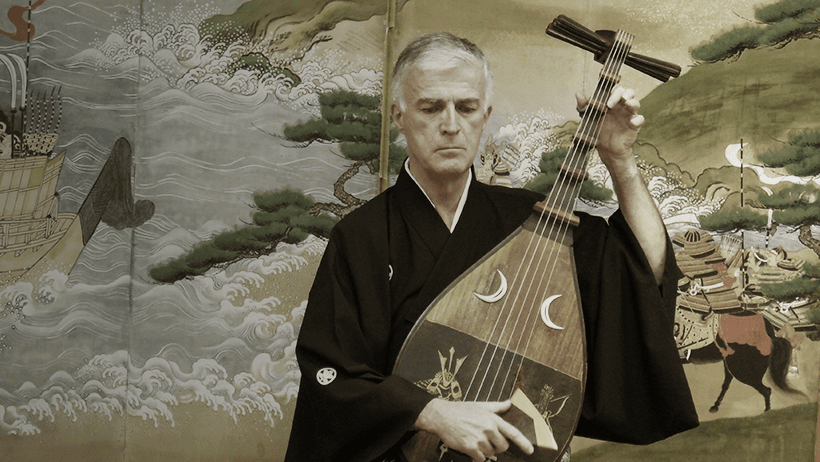
Introduction
The hero of this legend, the GENJI general Yorimitsu (948-1021), is often associated with ghost stories, the most famous of which is assuredly the “Earth Spider.” Included in the famous Tsurugi Chapter of the Tale of the Heike (Yashirobon version), this tale has been well known since the Kamakura period (1185-1333). Another extremely famous early version of this tale is the Noh play, which was then later followed with an equally popular retelling in the nagauta piece Tsuchigumo, written by the Kabuki playwright KAWATAKE Mokuami (1816-1893). First staged in 1881, the play remains a recurrent favorite. There is also a noteworthy handscroll, the Tsuchigumo sōshi, in which the story is graphically visualized.
The anonymous author of the biwa text of Tsuchigumo borrowed many lines from both the Noh and nagauta versions of this tale (see Japanese notes). YAMAZAKI Kyokusui composed the musical setting for this text, which became, with other famous ghost stories—Ibaraki, Adachigahara, and more—one of her most cherished pieces.
Synopsis
In the “Eastern Mountain” region of Kyoto, the legendary general GENJI Yorimitsu, also known as Raikō, lies suffering from an illness in his residence. One evening in the eight month—autumn according to the lunar calendar—Raikō’s illness worsens and he becomes delirious with feverish dreams. Despite his illness, he is aware of a figure in the semi-darkness. This person introduces himself as an erudite monk from Mt Hieizan with a profound knowledge of esoteric treatments, rites of exorcism, that will cure Raikō’s illness, which Raikō then allows him to perform. With the onset of the rituals, Raikō notices that the shadow the monk casts on the wall is not that of a human, but of a monstrous spider. With that, the false monk realizes that his guise has failed, and he discloses his true identity as the evil Earth Spider who is attempting to subjugate the entire country. Raikō leaps from his place of rest and strikes the demon with a famous blade he inherited, the sword Hizamaru. Fatally wounded, the Earth Spider flees and dies in a remote corner of Tōji temple with the crumbling of an ancient tomb.
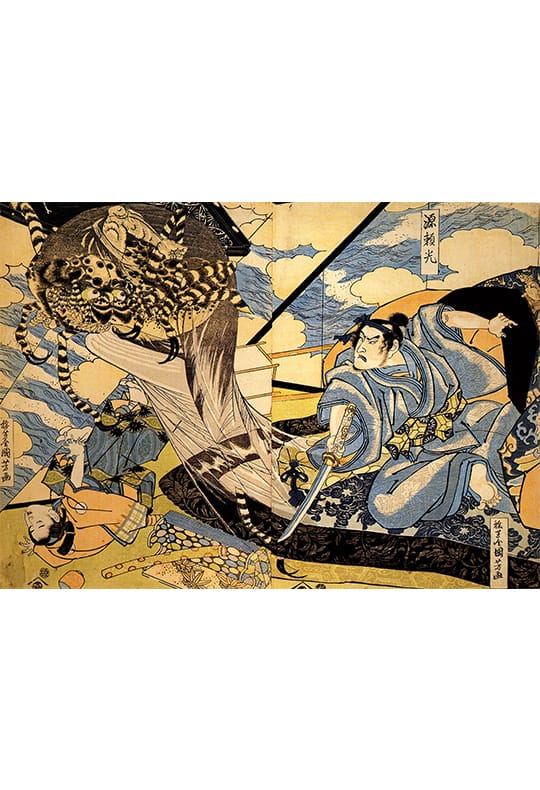
Lyrics
-
1. Vanishing here, Bald verschwindend
Koko ni kie 此処に消え
-
2. only to merge there, the ephemeral foam on the waters, bald sich findend – Blasen allenthalben,
kashiko ni musubu utakata ya 彼処に結ぶ泡沫や
-
3. is little more than the shimmering dreams of a mayfly. flüchtig wie die Träume einer Eintagsfliege.
ge ni kagerō ga tsuka no yume 実に蜉蝣がつかの夢
-
4. Yorimitsu, the head of the GENJI-clan, Großfürst Yorimitsu aus dem GENJI-Hause
Genke no chōja Yorimitsu kō 源家長者頼光公
-
5. was lost in thought at the end of the eighth month. brütet in der Sommerhitze vor sich hin im achten Monat.
omoi zo izuru hazuki no sue 思いぞ出る葉月の末
-
6. The storm of the morning penetrating his restless body, Schmerzender als Morgenstürme, die den Körper schütteln,
sozoro mi ni shimu asaarashi そゞろ身にしむ朝嵐
-
7. but more worrying than this was the anxiety troubling his heart. sind die Qualen seines Herzens,
sore yori kokoro nayamashiku 其より心悩ましく
-
8. As he was reclining on his pillow, als er auf dem Krankenlager ruht.
makura ni koso wa tsuki ni kere 枕にこそはつきにけれ
-
9. over the purpling Mount Higashiyama, Es färbt sich jetzt der Ostberg in der Hauptstadt purpurn
murasaki komuru Higashiyama 紫こむるひがし山
-
10. the black curtains of the night fell. und die Nacht lässt langsam ihren Vorhang sinken.
tozasuya kuroki yo no tobari とざすや黒き夜の帳
-
11. The lanterns in the streets of the capital, In den Straßen Kyotos gehen die Laternen –
Miyako ōji no tomoshibi mo 京大路の灯も
-
12. darkened with each stroke of the bell, Glockenschlägen folgend – eine nach der andern aus.
kane no ne goto ni kiete yuki 鐘の音毎に消て行き
-
13. and the waters of the Kamo River ceased their murmuring. Der Kamo-Fluss verstummt allmählich,
Kamo no seseragi oto o tae 鴨のせゝらぎ音を絶へ
-
14. In the dead of night, the moon disappeared into misty clouds, und der klare Mond verbirgt sich hinter Wolken.
tsuki kiyoki yowa to mo miezu kumogiri no 月清き夜半とも見ず雲霧の
-
15. and the dark deepened over his palace. Langsam legt die dunkle Nacht sich über Yorimitsus Residenz,
fukeyuku yoru no on’yakata 更け行く夜の御館
-
16. The whispering winds beckoned and eniticed a sad desolation. ein leichter Wind vertieft die Einsamkeit mit seinem Säuseln.
sabishisa sasou kaze no oto さびしさ誘ふ風の音
-
17. But how strange! The bright lamps, Seltsam, wie allmählich jetzt die Lampe
ayashi ya akaki tomoshibi no あやしや明き灯の
-
18. slowly dimmed, schwächer scheint.
shidai shidai ni kage kuraku 次第次第に影暗く
-
19. And the insects clustered near the wick, Die Motten kreisen um die Leuchte,
chōji ni karamu hitorimushi 丁字にからむ火取虫
-
20. only to worsen his suffering. Ach, die Schmerzen werden immer größer.
mata mo ya tsunoru onnayami 亦もやつのる御悩み
-
21. At that very moment, a monk suddenly appeared, Unversehns steht da ein Mönch
orishimo kotsunen hitori no sō 折しも忽然一人の僧
-
22. standing near his pillow. nicht weit vom Krankenlager:
onmakurabe ni tatazumite 御枕辺に佇みて
-
23. “Lord Yorimitsu, “Fürst Yorimitsu,
ika ni Yorimitsu kō いかに頼光公
-
24. how do you fare?” wie ist denn Ihr Befinden?“
onkokoromochi wa nan to gyoiri sōrō zo 御心持は何と御入候ぞ
-
25. Without knowing if this solicitous voice was real, Diese Stimme, ist sie wirklich,
tazunuru koe ni utsutsu to mo 尋ぬる声に現とも
-
26. or naught but a dream, Yorimitsu looked up. oder ist sie nur ein Traum?
yume tomo wakazu uchimiyari 夢ともわかず打見やり
-
27. “Aah, how strange! „Ach je, es wird mir bang!
ara ibukashi ya あら訝しや
-
28. A priest nobody knows, or what appears to be a priest, Wie kann ein unbekannter Mönch
tare tomo shiranu sōgyō no 誰とも知らぬ僧形の
-
29. has come to visit me in the depths of the night? zu dieser späten Stunde mich besuchen?
shin’ya ni oyonde ware o tou 深更に及んで我を訪う
-
30. Whence have you come?” Wo denn kommt Ihr her?“
izure yori watari sōrō zo いづれより渡り候ぞ
-
31. “From the West Pagoda of the Hieizan Temple, “Ich stamme von der Westpagode auf dem Tempelberge Hieizan,
kore wa Hieizan no saitō これは比叡山の西塔
-
32. where I live in the Hōtō Monastery as a wandering monk. wohne in dem Hōtō-Kloster, bin ein Wandermönch.
Hōtōin ni sumu yūsō ni te 宝憧院に住む遊僧にて
-
33. I have heard that the Lord Yorimitsu, Ich hörte, ehrenwerter Fürst Yorimitsu,
uketamareba Yorimitsu kō 承れば頼光公
-
34. suffers from a lingering illness. dass Ihr seit langem krank darniederliegt
naga no itatsuki onnayami 長の病御悩み
-
35. And yet, despite having tried all remedies, und manche Kur erduldet habt.
yakuseki iryō no waza o itashi 薬石医療の業をいたし
-
36. having commissioned high priests from many temples, Berühmte Priester habt Ihr schon gerufen,
shozan no kōsō hitasura ni 諸山の高僧ひたすらに
-
37. To conduct exhaustive prayers and austerities, dass sie für Euch beten,
kigan shūhō o tsukusedomo 祈願修法をつくせ共
-
38. none of these has had any efficacy. aber keine Heilung hat sich eingestellt.
imada shirushi no arazaru yoshi 未だしるしのあらざる由
-
39. I, through the merits of my religious power, Ich aber habe ganz besondere Kräfte,
waga hōriki no kudoku ni te 我が法力の功徳にて
-
40. shall exorcise the spirits seeking revenge, jeden üblen Geist treib’ ich Euch aus,
mononoke no tatari harawan to 物の怪の祟はんと
-
41. and have therefore humbly come this evening to your august abode.” und suchte deshalb Eure Residenz heut‘ Abend auf.“
koyoi yakata ni mairite sōrō 今宵館に参りて候
-
42. “From your appearance, distinguihed priest, “Ihr ehrt mich sehr;
miukeshi tokoro kisō ni wa 見受けし所貴僧には
-
43. you seem to be a great man, both principled and wise, Ihr seid bestimmt ein Weiser,
hōtoku kenbi no gonja to oboyu 法徳兼備の権者と覚ゆ
-
44. enlightened through your travels on the road of Buddhism, dem Erleuchtung ‚auf dem Stein’ und ‚unterm Baum’ zuteil ward.
jukasekijō no onsatori 樹下石上の御さとり
-
45. And remarkably well trained as an ascetic.” Sicher hat euch die Askese stark gemacht.“
nakanaka kugyō mesareshi ya 仲々苦行召されしや
-
46. “While I have never taken pride in this, “Ich möcht’ mich ja nicht rühmen,
motoyori ogoru ni arazaredo もとより慢るにあらざれど
-
47. as you can see, I am a warrior, aber meine Herkunft, ein Geschlecht von Rittern,
ikasama ware wa mononofu no いかさま我は武士の
-
48. born to a noble lineage.Nevertheless, darf sich mit dem Ruhm von großen Taten brüsten.
yoshi aru ie ni umareshi ga 由ある家に生れしが
-
49. I travelled, my robes damp with dew, Ich mich begab mich auf die Wanderschaft im taugetränkten Reisekleid,
koromo tsuyukeki tabi no sora 衣つゆけき旅の空
-
50. I travelled, my robes damp with dew, ich mich begab mich auf die Wanderschaft im taugetränkten Reisekleid
koromo tsuyukeki tabi no sora 衣露けき旅の空
-
51. I fled the dusty floating world, und habe dieser schnöden Welt entsagt.
chiri no ukiyo o nogare kite 塵の浮世を遁れ来て
-
52. my flesh sliced by the piling snows. Der kalte Schnee hat meine Haut geschunden,
furitsumu yuki ni hada o saki 降りつむ雪に肌をさき
-
53. I accumulated the merits of penance and hardship, doch durch Armut und Enthaltsamkeit
nangyō kugyō no kō o tsumi 難行苦行の功を積み
-
54. and became a disciple of The Law.” fand ich zum ‚Heiligen Gesetz’.“
nori o osameshi mono ni te sōrō 法を修めし者にて候
-
55. “The gratitude of receiving the prayers, “Von einem solch erlauchten Mönch
kakaru imijiki kōsō no かゝるいみじき高僧の
-
56. from such an exalted priest such as yourself! Gebete zu empfangen, ist mir eine Ehre.
kinen o ukuru katajikenasa 祈念を受くる忝けなき
-
57. Please, begin with your prayers!” Zögert nicht, beginnt sogleich, ich bitt‘ um Eure Hilfe.“
iza iza shuhō sōrae ka shi いざいざ修法候へかし
-
58. “This is the easiest of requests. “Das fällt mir nicht schwer.
ito yasuki koto nite sōrō いと易き事にて候
-
59. by the mercy of the Five Celestial Kings, Wohlan, im Namen der Fünf Himmelsfürsten,
ide ya godaimyō o honzon to nashi いでや五大明王を本尊となし
-
60. I wish to conduct the secret rituals to cure this troubling illness.” lasst uns mit geheimen Riten Eure Krankheit heilen.“
gonō honpuku no hihō tsukamatsuran to 御悩本復の秘法仕らんと
-
61. And he rubbed his thousand-beads rosary, sara sara, Alle Perlen an dem Rosenkranz – sara sara –
irataka no juzu sara sara to 最多角の珠数さらさらと
-
62. and he rubbed, and he rubbed, reibt er, reibt er, kommt zu Yorimitsus Krankenlager,
oshimomi oshimomi Yorimitsu no 押もみ押もみ頼光の
-
63. and slowly drew near to Yorimitsu. ganz in seine Nähe.
onmae chikaku yorikitaru 御前近く寄り来る
-
64. But, how strange! The shadow of the lamp’s dim light, Ha, unheimlich ist der Schatten der Gestalt,
ara ibukashiya hokage ni shiruki sono sugata あら訝しや灯影にしるきその姿
-
65. in pursuing the truth, it flees in fright, es wirkt, als renne sie herum?
jitsu ka to oeba kyo ni hashiri 実かと追へば虚に走り
-
66. floating and sinking, my love Was schwebt denn da, was webt denn da?
ukitsu shizumitsu waga seko ga 浮きつ沈みつ我が背子が
-
67. should be here this evening, Es sollte mein Geliebter heute Abend kommen,
kurubeki yoi nari sasagani no 来べき宵なりさゝがにの
-
68. but instead, there is something that moves like a spider. aber eine Spinne treibt sich nur herum.
kumo no furumai kanete yori 蜘蛛の振舞かねてより
-
69. It looked so suspicious that in a flash, Die Angst wird immer grösser, denn auf einmal
ayashi to mieshi issetsu na あやしと見えし一殺那
-
70. he waved his sleeves extinguishing the lamp beside him, schwingt sein Ärmel, und das Licht geht aus,
sode o kaeseba katawara no 袖を返せばかたわらの
-
71. and the dark was absolute. stockfinster wird der ganze Raum.
tomoshibi kiete shin no yami ともし火消えて真の暗
-
72. Though there was no breeze, the lamp Obwohl kein Lüftchen weht,
kaze mo fukanu ni tomoshibi no 風も吹かぬに灯の
-
73. went out. “Could this be the deed of a demon?” verlöschte eben doch die Lampe – „ist vielleicht ein Dämon hier?”
kieshi wa keshō no waza naru ka 消えしは化生の業なるか
-
74. “Your very question is ludicrous! It is contemptibly absurd! “Das fragst du, Dummkopf du, dass ich nicht lache!
tou mo orokaya shōshi ya na 問ふも愚や笑止やな
-
75. Can you not know my powers? Kennst du meine Kräfte nicht?
waga nasu waza to shirazaruka 我がなす業と知らざるか
-
76. Do you not know me? From old, und weißt du nicht, wer vor dir steht?
ware o shirazu ya sono mukashi 我を知らずやその昔
-
77. I lived on Mount Katsuragi, Seit alters leb’ ich auf dem Berge Katsuragi
Katsuragiyama ni toshi furishi 葛城山に年古りし
-
78. the ancient spider spirit with powers no mortal could have. als Dämonenspinne über grenzenlose Macht verfügend.
jintsūjizai no kumo no sei 神通自在のくもの精
-
79. When the sacred wind of Ise idles, Wenn die Götterwinde nicht aus Ise wehen,
Ise no kamikaze fukazareba 伊勢の神風吹かざれば
-
80. I spin my web throughout the sixty provinces, spinn‘ ich meine Netze über mehr als sechzig Länder aus,
rokujū yo shū ni su o harite 六十余州に巣を張りて
-
81. in my plot to create a demons’ world!” und schaffe eine Geisterwelt!“
makai to nasan kuwadate nari 魔界となさん企なり
-
82. Before he was finished speaking, the priest transformed, Doch kaum geendet, wandelt dieser Priester
ii mo owara de shichiseki no 言いもおわらで七尺の
-
83. into a monstrous demonic spider some seven feet high, sich in eine riesig große Spinne,
kumo no kigyō to henjitsutsu 蜘蛛の鬼形と変じつゝ
-
84. spinning thousands of threads. die jetzt tausend Fäden speit.
kuridasu chisuji no itosuji ni 繰り出す千筋の糸筋に
-
85. His body benumbed, Yorimitsus Körper wird gelähmt,
gotai wa shibiruru bakari ni te 五体はしびるゝばかりにて
-
86. trapped like the wings of a dragonfly or butterfly in a spider’s web, als wäre er ein Schmetterling, der sich im Spinnen-Netz verfängt.
seirei kochō no hagaijime 蜻蛉胡蝶の羽交締め
-
87. Yorimitsu nonetheless collected himself, Ein Herz sich fassend
Yorimitsu kokoro torinaoshi 頼光心とり直し
-
88. and seized the sword, “Hizamaru”, lying close to his pillow, greift Yorimitsu nach seinem Schwert Hizamaru,
onmakurabe naru Hizamaru no 御枕辺なる膝丸の
-
89. drawing the blade with the speed of a lightning bolt. teilt Hiebe aus wie Blitze.
saya hashiraseshi den issen 鞘走らせし電一閃
-
90. In the darkness, one cry, and the specter, In der Dunkelheit ein Schrei!
yami ni hitokoe mononoke no 闇に一声物の怪の
-
91. vanished in an instant. sogleich verschwindet die Gestalt.
sugata wa satto usenikeri 姿はさっと失せにけり
-
92. In the shadowed thickets of Tōji temple. Versteckt in Büschen hinterm Tōji Tempel
tare ni Tōji no yabukage ni 誰に東寺の藪陰に
-
93. The stones of an ancient tomb, fällt ein tausend Jahre altes Grab
chitose o furishi furuzuka no 千年を古りし古墳の
-
94. lie, smashed into rubble, with the Earth Spider. in Trümmer, als die Spinne stirbt.
ishi o kuzushite tsuchigumo o 石を崩して土ぐもを
-
95. Now that it is slain, the imperial reign in spring is peaceful. Doch jetzt, da sie geschlagen ist, herrscht Friede auf der Welt.
uteba osamaru miyo no haru 討てば治まる御代の春
-
96. The virtue of the “Earth-Spider-killing-sword” Das „Spinnenschlage“-Schwert ist reich an Tugend;
kumokirimaru no tsurugi no toku くも切り丸の剣の徳
-
97. Glitters with gratitude, Dank gebührt dem großen Held.
hikari kagayaku arigatasa 光かゞやく有難さ
-
98. for a thousand, eight thousand, ten thousand ages, Wir werden bis in alle Ewigkeit,
chiyo ni yachiyo ni yorozuyo ni 千代に八千代に万代に
-
99. until stones are covered with moss, may this story be told for posterity. wenn über Steine Moos gewachsen ist, noch seine Tat besingen,
koke no musu made kataritsutaen 苔のむすまで語り伝へん
-
100. until stones are covered with moss, may this story be told for posterity. wenn über Steine Moos gewachsen ist, noch seine Tat besingen.
koke no musu made kataritsutaen 苔のむすまで語り伝へん
Notes
4. Lord Yorimitsu of the GENJI-clan…In literature, this military leader is better known as MINAMOTO no Raikō (948?–1021?). He is the first well-known warlord of the MINAMOTO or GENJI clan, and a main figure in different heroic stories of the Heian period (794–1185). 9. Mount Higashiyama… The “Eastern Mountain” is an area in Kyoto where the most splendid ancient temples and residences are located. 13. river Kamo… this is the main river in Kyoto running from north to south. 31. West Pagoda of the Hieizan-temple… Mt Hieizan is located to the northeast of Kyoto. According to geomancy, all evil comes from the northeast, and hence, a huge temple complex, Enryakuji, was built on this mountain to protect the capital. This temple was one of the main centers of Buddhist knowledge and wisdom. The West Pagoda complex, now a collection of different temple buildings none of which is a pagoda, was famous for training in the ascetic disciplines involving the martial arts. 32.1. Monastery Hōtō… This is a building belonging to the West Pagoda complex. 32.2. Wandering monk…the term in Japanese refers to a monk who was well versed in different disciplines—performing arts and rituals. 35. all remedies… In the Japanese text, the treatment of yakuseki is mentioned. This can be acupuncture or a treatment in which heated stones are placed on different parts the body to cure various illnesses. 59. The Five Celestial Kings… According to the Shingon Sect, these five deities protect the Five Wisdoms of Buddha. They are Fudō Myōō, Gōzanze Myōō, Gundari Myōō Daiitoku Myōō and Kongō Yasha. 61. rosary beads… the Japanese term here specifically indicates a rosary of angular shaped beads, which make much more noise when rubbed than the normal round beads. 67. / 68. ‘My beloved (etc.) … This is a citation of a poem from the “Kokinwakashū”, an anthology of poetry compiled in 905 by the order of emperor Daigo. 77. Mount Katsuragi … is located in present-day Nara Prefecture. 80. througout the sixty provinces…is an expression indicating the entire country of Japan. 88. Hizamaru… this was the name of a famous sword held by the MINAMOTO family. Tradition holds that the blade was 81cm long. It was used in legendary fights, and with each fight, its name was changed: from Hizamaru to Kumokiri, for example (see line 96), to Hoemaru and finally to Usumidori. 92. Tōji temple… This temple, “Eastern Temple,” is located in south Kyoto. It was formerly complemented by the “West Temple,” which, however, no longer exists. Today, it is a Kyoto landmark with its huge pagoda. 93. a thousand year old tomb… This passage may refer to the nagauta version of this story, in which the four main retainers of lord Yorimitsu the so-called Shitennō, chased the Earth Spider as far as Tōji temple. There they smashed an ancient tomb, which forced the hidden Earth Spider to appear. then fought the demon and successfully dispatched it. 99. stones are covered with moss… this expression is taken from a poem in the anthology “Kokinwakashū” (see notes line 67. / 68.)

Music Notes
YAMAZAKI Kyokusui set this ballad to music. Her dark voice was the ideal instrument for conveying the supernatural terror of this ghost story. In her compositions, YAMAZAKI favored quick change of styles and moods, and included newly composed interludes to highlight the differences of her pieces from the primary repertoire composed by the head of the Tachibana-school TACHIBANA Kyokusō. The thrill of this piece lies in YAMAZAKI’s use of different voices: the narrator, the sick Raikō, and the ghost—first in its disguise as a monk and then in its true form as a ghost.
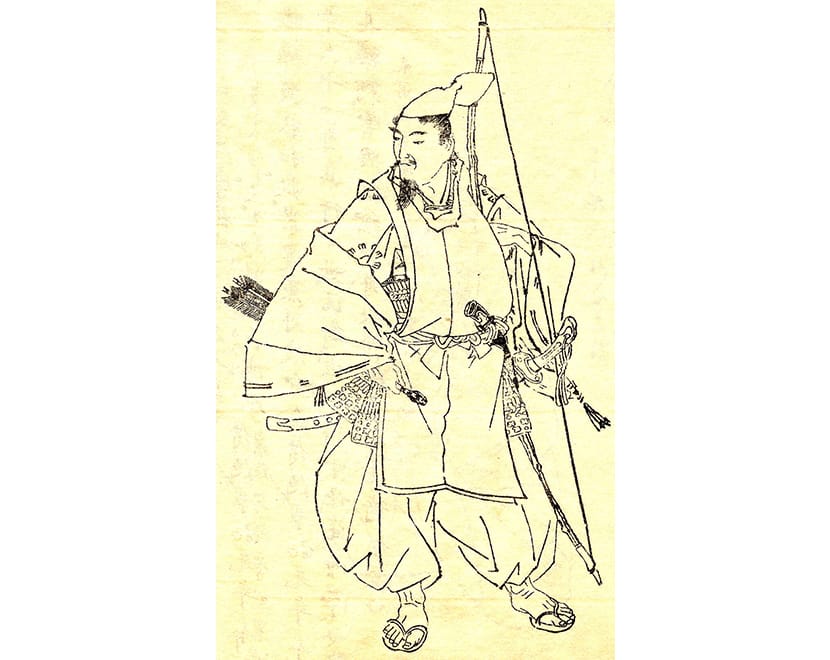
The function of thebiwa in many parts is to underlie the eeriness of a scene, sometimes by underscoring the vocal line with a rhythmical pattern that enhances the expressivity of the voice. When the monk reveals his true identity as the ghost-spider the newly composed kumo, or “spider”, is performed; this is a wonderful showy interlude because the left hand dances over the strings like a spider. The expressive climax is reached in lines 89/90, the delivery of which require the performers to approach shouting rather than singing as they accompany themselves with a rapid and noisy tremolo with the strings pulled as much as physically possible. After this, the mood settles and the ballad ends with a quiet arioso praising the hero and his vanquishing the spider-ghost.
